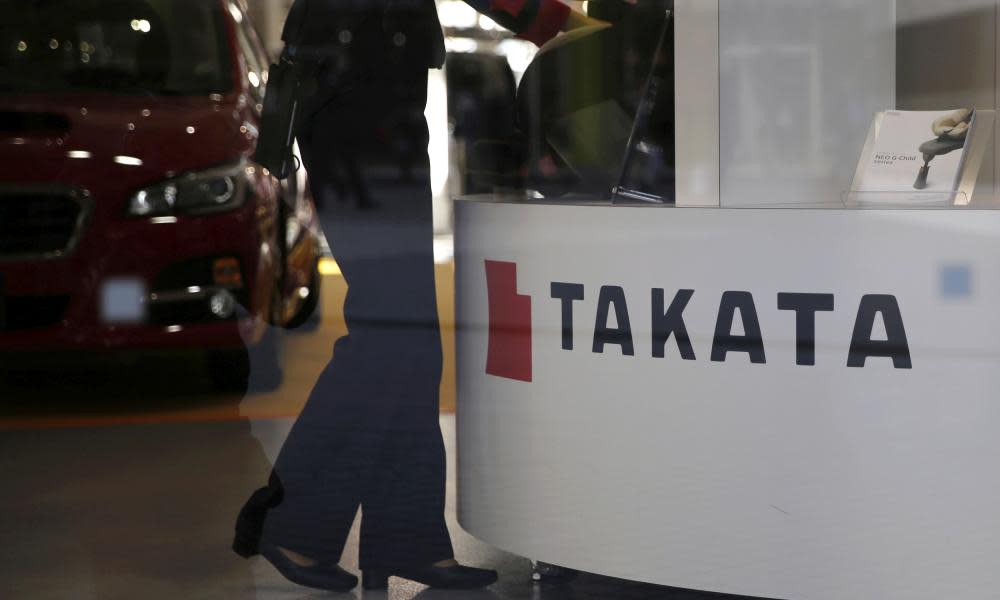Australian carmakers replace airbags with same faulty product, says Choice

The federal government may force a mandatory recall of thousands of vehicles to repair potentially lethal faulty airbags.
A Choice investigation found at least five car manufacturers recalled vehicles only to replace them with the same faulty devices.
A worldwide recall has been underway since 2009 for Takata airbags, which have killed more than 18 people and injured 180 worldwide, because the gas inside them becomes volatile over time and after exposure to humidity, potentially causing the airbags to explode and send metal fragments flying into the car.
The death of a Sydney man earlier this month was probably caused by a faulty airbag, which sent shrapnel into his neck, police have said.
Australian manufacturers Toyota, Mazda, BMW, Lexus, and Subaru have admitted replacing the faulty airbags with the same product in Australia, treated with a water-absorbing chemical designed to address the problem. But the Australian Competition and Consumer Commission says these may also degrade over time, meaning the new airbags will have to be replaced again in about six years.
The ACCC has launched an investigation into the recall, “urgently seeking information” from the federal infrastructure department, which is monitoring the recall.
“We would have very serious concerns if manufacturers were found to be misleading consumers about their car’s safety in breach of their obligations under consumer law,” ACCC chairman Rod Sims said.
The minister for urban infrastructure Paul Fletcher said he had written to all affected manufacturers and “seeking a comprehensive status update on the progress of their recall program and their communications with owners of vehicles potentially affected.”
Fletcher said he had also directed the Department of Infrastructure and Regional Development, which regulates new vehicle sales in Australia, to provide an urgent report on the recall – and said the federal government had the power to force a mandatory recall if the manufacturers were not acting quickly enough.
Since 2009, more than 2.3m vehicles in Australia have become subject to the recall of airbags made by the Japanese manufacturer. The airbags are in 60 makes of cars sold in Australia, including vehicles made by Honda, Toyota, BMW, Mitsubishi, Subaru, Jeep, Nissan, Chrysler and Dodge.
Product Safety Australia has published a full list of the cars affected by the Takata recall.
In Australia, 850,000 cars have already had their airbags replaced, but more makes are expected to be added to the recall list. Sims said drivers of affected cars should not ignore a recall notice issued for their vehicle’s airbags.
“The airbags degrade over time and can become lethal by misdeploying and firing metal shards at the car’s occupants,” Sims said.
“If consumers have already had their airbag replaced, they should contact their manufacturer for advice as to what kind of airbag it was replaced with and how long it is expected to last.”
Choice contacted the 14 car manufacturers affected in Australia over their recall process: many confirmed a percentage of cars were refitted with like-for-like replacements and will therefore have to be recalled again.
“While estimates of how long the dodgy Takata airbags take to break down vary, it’s deeply concerning to think these bombs in a bag lie in wait in many popular cars, poised to explode their deadly shrapnel into unsuspecting victims,” Choice spokesman Tom Godfrey said.
“Although Toyota, Mazda, BMW, Lexus and Subaru admitted to Choice they made identical replacements, perhaps more worrying are the other manufacturers who continue to refuse to share this information with the public.”
In a statement, Toyota confirmed it had refitted Takata products as replacements in some cars.
“This action provided safety for a number of years, however, due to exposure to the environment over time, these airbags will need to be replaced again.
“Toyota has a rectification process in place for impacted customers.”
Nissan, Honda and Mitsubishi did not comment on the details of their recall program.
Chrysler, Dodge and Jeep confirmed they did not install like-for-like replacements.
Takata filed for bankruptcy protection in Japan last month. It has said it believes the recall cannot be completed before the end of 2019.
Godfrey said he was also concerned by reports drivers were being told they would have to wait more than six months for replacement airbags.
The Choice investigation cited testing of Takata airbags by the US national highway traffic safety administration last year, in which 660 of 245,000 airbags ruptured.
“If you were to apply to same percentage of these failures to the 1.44 million cars in Australia yet to be recalled, the number of airbags that would deploy defectively would be 3,889,” Choice said.
On 13 July, 58-year-old Sydney man Huy Neng Ngo was killed when his airbag misdeployed following a crash in Cabramatta. In April, a Northern Territory woman suffered severe injuries from her airbag after an accident.
Federal, state and territory consumer affairs ministers are scheduled to meet next month to discuss changes to Australian Consumer Law. Among changes proposed are a general safety provision and a consumer right to demand a refund after experiencing multiple minor failures with a product.


